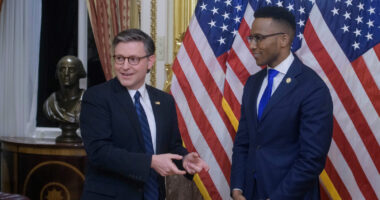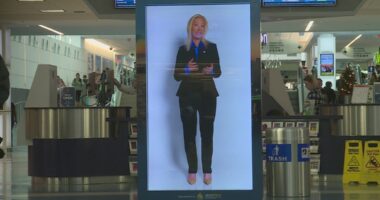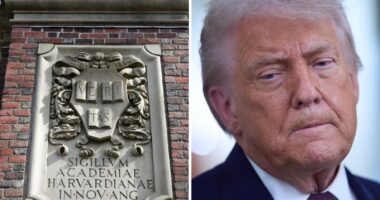Share this @internewscast.com
The Supreme Court is set to deliberate on Tuesday regarding state laws that prevent transgender girls and women from participating in school sports teams.
While lower courts have sided with transgender athletes in Idaho and West Virginia who contested these state bans, the Supreme Court, with its conservative majority, may take a different direction.
Over the past year, the justices have upheld state restrictions on gender-affirming care for transgender youth and permitted the enforcement of various limitations affecting the transgender community.
This legal battle unfolds in the context of broader initiatives by President Donald Trump aimed at restricting the rights of transgender individuals. His actions include efforts to remove transgender people from military service and asserting that gender identity is fixed at birth.
The cases under review originate from Idaho and West Virginia, two of the early states in a wave of Republican-led regions that have enacted prohibitions on transgender athletes participating in female sports teams.
The court is tasked with balancing the allegations of sex discrimination brought by transgender individuals against the states’ argument that these laws ensure fair competition for women and girls.
In the first case, Lindsay Hecox, 25, sued over Idaho’s first-in-the-nation ban for the chance to try out for the women’s track and cross-country teams at Boise State University in Idaho. She didn’t make either squad but competed in club-level soccer and running.
Becky Pepper-Jackson, a 15-year-old high school sophomore, has been taking puberty-blocking medication, publicly identified as a girl since age 8 and has been issued a West Virginia birth certificate recognizing her as female. She is the only transgender person who has sought to compete in girls’ sports in West Virginia.
Pepper-Jackson has progressed from a back-of-the-pack cross-country runner in middle school to a statewide third-place finish in the discus in just her first year of high school.
Prominent women in sports have weighed in on both sides. Tennis champion Martina Navratilova, swimmers Summer Sanders and Donna de Varona and beach volleyball player Kerri Walsh-Jennings are supporting the state bans. Soccer stars Megan Rapinoe and Becky Sauerbrunn and basketball players Sue Byrd and Breanna Stewart back the transgender athletes.
The high-court arguments are expected to focus on whether the sports bans violate the Constitution or the landmark federal law known as Title IX, which prohibits sex discrimination in education.
In 2020, the Supreme Court ruled LGBTQ people are protected by a landmark federal civil rights law that prohibits sex discrimination in the workplace, finding that “sex plays an unmistakable role” in employers’ decisions to punish transgender people for traits and behavior they otherwise tolerate.
But last year, the six conservative justices on the nine-member court declined to apply the same sort of analysis when they upheld state bans on gender-affirming care for transgender minors.
The states supporting the prohibitions on transgender athletes argue there is no reason to extend the ruling barring workplace discrimination to Title IX, which dramatically increased opportunities for girls and women in school sports.
Lawyers for Pepper-Jackson argue that the law protects people like their client from discrimination. They are asking for a ruling that would apply to the unique circumstances of her early transition. In Hecox’s case, her lawyers want the court to dismiss the case because she has forsworn trying to play on women’s teams.
Despite the small numbers of transgender athletes, the issue has taken on outsize importance. The NCAA and the U.S. Olympic and Paralympic Committees banned transgender women from women’s sports after Trump, a Republican, signed an executive order aimed at barring their participation.
The public generally is supportive of the limits. An Associated Press-NORC Center for Public Affairs Research poll conducted in October 2025 found that about 6 in 10 U.S. adults “strongly” or “somewhat” favored requiring transgender children and teenagers to only compete on sports teams that match the sex they were assigned at birth, not the gender they identify with, while about 2 in 10 were “strongly” or “somewhat” opposed and about one-quarter did not have an opinion.
About 2.1 million adults, or 0.8%, and 724,000 people age 13 to 17, or 3.3%, identify as transgender in the U.S., according to the Williams Institute at the UCLA School of Law.
A decision is expected by early summer.
Copyright © 2026 by The Associated Press. All Rights Reserved.

















